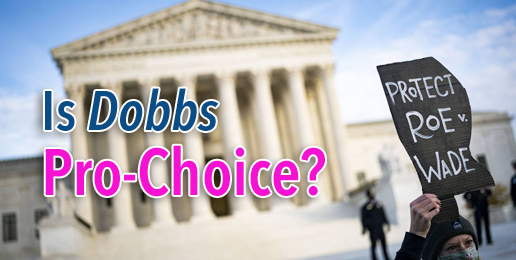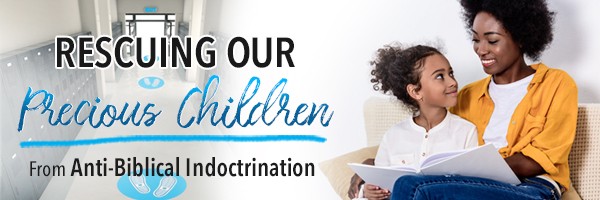
It’s been about 18 months since Dobbs was handed down, and I still remember the elation mixed with near-disbelief that I felt when I first heard the news. As with many of the most important memories in life, I even remember where I was when I was told—standing in the dining room of a summer retreat center on a sunny June day.

All my life, I had grown up hating the monstrosity of Roe v. Wade, and while I had heard speculation about its future demise as Trump-appointed justices trickled onto the Court, it still was a bit hard to believe it when Dobbs finally landed.
Because the ruling freed states to prohibit abortion within their own jurisdictions, I will forever be grateful for the throngs of children Dobbs has already saved and will save in the future.
But—although it took me a while to realize there was even anything amiss in such a stunning pro-life victory—as time went on, I began to realize that there’s one thing deeply troublesome about Dobbs. The decision conspicuously avoided claiming that abortion was wrong because it takes the life of a human being. Instead, the decision framed the issue as a question of democracy. Take a look at Justice Kavanaugh’s assessment in his concurring opinion:
“After today’s decision, the nine Members of this Court will no longer decide the basic legality of pre-viability abortion for all 330 million Americans. That issue will be resolved by the people and their representatives in the democratic process in the States or Congress.” (p. 10 of his concurrence)
As much as I rejoice that the ruling liberated the issue of abortion from the aggressive stranglehold of unelected judges and returned it to “the people and their elected representatives” (p. 35 of the opinion), I also balk at how Dobbs simply left it there.
Sure, 9 unelected judges shouldn’t decide the morality of abortion for the whole country. But in an ultimate sense, is it any better that 330 million people are now deciding it? Since when was the value of anyone’s life determined by popular vote?
A vote is the indication of a choice between potential rulers or proposed laws. When the people or their elected representatives vote on abortion, they are making a choice about whether it should be legal or not. So here’s my question: whoever said this issue was a choice to begin with? Don’t human lives have value apart from whomever is choosing whether or not to accept them?
The pro-abortion forces have masterfully branded themselves as the proponents of a “woman’s right to choose.” And we are right to reject this notion—no woman has the right to choose whether her child lives or dies. But will the pro-life side be content with branding themselves as the proponents of the “people’s right to choose?”
Shouldn’t a baby have her right to life even if not a single other person on the face of the earth would choose to value her?
I really started to think about this after reading an article by David Crawford, an associate professor of moral theology and family law at the John Paul II Institute. Writing about the liberal and conservative justices on the Court, he observed that “in effect, both sets of justices (in their capacity as judges) are ‘pro-choice’; it is just that they differ on who should make that choice” (p. 1221).
Sure, Dobbs gave the pro-life movement a preliminary win, but by shifting choices around. The choice went from the woman to the voter base of her state. But it’s still just that—a choice.
Crawford then went on to point out that neither conservative nor liberal justices are “able to make, as a matter of Constitutional interpretation, a reference to what is, in this case to what an embryo or fetus is. Rather, they both respond only to differing sides of the clamor of wills” (p. 1221).
And this analysis becomes crystal-clear if we were to apply it to any child after she is born. Imagine—for whatever perverted reason—a mother wanted to do away with her five-year old. According to the way that American jurisprudence has handled abortion for decades, a court would place the mother’s desires over the people’s desires.
According to the way that Dobbs changed things, a court would now place the people’s desires over the mother’s desires. But both situations are begging for someone to mention the elephant in the room: doesn’t the five-year-old—by virtue of who she is—have a right to life, apart from anyone else’s desires?
Ironically, the Dobbs dissent—as scathingly vitriolic as it was—recognized this very problem with the Dobbs majority. Criticizing the majority’s fallback to democracy when such profound moral questions are at issue, the dissent argued that “the point of a right is to shield individual actions and decisions ‘from the vicissitudes of political controversy, to place them beyond the reach of majorities and officials and to establish them as legal principles to be applied by the courts'” (p. 32 of their dissent).
I couldn’t agree more.
Now, of course, the dissent was identifying the wrong right—the woman’s “right to choose” instead of the preborn baby’s right to life. But the dissent was correct that deferring to even popular judgment on issues of moral import does not solve moral issues.
American courts must actually take a position. This shoulder-shrugging, leave-it-up-to-the-people non-position is unavoidably itself a position—it is a clear statement that abortion is not the kind of moral issue that triumphs over whatever the people think.
Now, don’t get me wrong—Dobbs was an undeserved blessing that has saved countless priceless lives, and I wouldn’t go back to before June 2022 for anything. But in my opinion, Dobbs is still only a partial solution.
By refusing to recognize that the unborn have a constitutionally protected right to life, it is still ultimately pro-choice. And so it does not protect the infinite value that the unborn have, even when the majority of people in their state don’t care much for them.
Constitutional law should not be afraid to take a bold stand that the unborn are objectively people.
Resorting to democracy to save the unborn only works as long as democracy already wants to save the unborn. And the pro-life movement should not stop pushing to eradicate abortion in every state—even those where the entire population thinks differently. As important as democracy is to America, the will of the people does not trump God’s moral standards.























